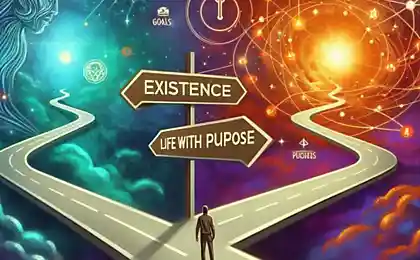815
How to set goals and achieve them without being distracted by secondary
People set themselves targets for different reasons. Some just need personal achievements. Others are trying to find out what is the meaning of life, or just want to make the world a better place. Sometimes we pursue any targets in the hope to improve myself (this internal goals) or try to achieve something for the external cause (this external goal).
The statement and the subsequent achievement of the objectives is of great benefit. In humans, there is a feeling of personal growth and he begins to realize the true value of life. Achievement of the objectives can improve our emotional well-being and gives a sense of independence and competence.
But sometimes the goals that initially appear to be positive, may have negative consequences. While I was in school and in medical school, I worked a lot. I was highly motivated and competitive, and then one of my mentors took me aside and said: "If you continue in the same spirit, you become the head of the National Institute of Mental Health ... and you hate it all»
.
He wanted to say that I was so engrossed in anticipation of future success and receiving all kinds of grants that completely broke away from his beloved biology, from psychology, research, clinical work and the world is psychiatry.
It took a great introspection, during which I finally realized that I must leave the safe okolonauchnyh fuss and go on a dangerous world, which is much more in charge of my real interests.
When goals become harmful
Targets can be harmful in the event that they are not too divorced from who you really are, or when they are too selfish. Bad goals can tear you away from the true purpose of the society or that would help you.
And if they lead to perfectionism, rather than to improve and have a profound effect on your emotional state, you can do more harm than good.
Since the formulation of goals from something life-affirming suddenly turns into a destructive force? This often occurs when your unconscious intentions determine your behavior more than the conscious goal.
For example, you deliberately seek to find a new relationship, but ultimately will destroy this initiative because of its objectives the unconscious - to grieve the relationship, the remaining last
. In pursuit of the intended purpose can eventually lose its own "I". For example, a woman wants to meet a decent man, fall in love and have a baby. To do this, she can start going out more often in society, and meet different people. More, it can keep yourself in good physical shape, making it healthy, will help to attract a partner and facilitate the coming generations.
But when the goal is completely subordinate her own, she can begin to consistently take sunbathe or killing her pills. That is, at some point cease to be interested in what is actually good for her.
There is another situation where the harmful is not a goal in itself, and the motivation behind it. For example, if a person is unable to resist something painful, he may try to ignore it, randomly running from one purpose to another, not realizing that it is time to stop and deal with the problem, and then start to work on the original objectives, improving life. < br>
Your goals are causing you pain?
There are a number of features that allow to determine what your goals become harmful.
Maybe you simply rested against the wall and you feel that you can no longer work to achieve their goals.
And perhaps, you feel that you are no longer a person who you really are, or continue to make the same mistakes over and over again while experiencing anxiety and depression, which may also be a sign that your goal, initially positive, it becomes destructive. Discomfort may be part of the changes and achievements, but the stress caused any negative feelings - this is a clear signal that something is wrong
. If you think that your goals have lost their positive effect, it is necessary to make a number of steps to get back on track.
Think about your goals and manage. Do not just set goals and pursue them. We must focus your energy on managing your goals so that the goals are not controlled by you. Ask yourself whether this goal is that who you are? How does it change you over time? Reaching the target, you will feel a greater or lesser connection with others?
Discuss your goals with those who you trust. They often see what you do not see.
Think of those whom you will be disappointed, if fail. Try to show compassion and realize that if you disappoint yourself, you will be even worse if you are upset with the other.
Get rid of the "Plan B". If you reach the goal you can not even, it may be due to the fact that your backup plan difficult to achieve the main goal. At some point you have to commit yourself to the main goal, and it can mean the rejection of the plan "B" - to make it easier to implement the plan "A»
. Achieving these goals and maintain life satisfaction - are not mutually exclusive things. When you are pursuing the right goals and do it in the right direction, these things naturally complement each other. One thing to keep in mind you - this is not your goal. Your goals should be, rather, the cement of your internal drive - your passion and hope.
The statement and the subsequent achievement of the objectives is of great benefit. In humans, there is a feeling of personal growth and he begins to realize the true value of life. Achievement of the objectives can improve our emotional well-being and gives a sense of independence and competence.
But sometimes the goals that initially appear to be positive, may have negative consequences. While I was in school and in medical school, I worked a lot. I was highly motivated and competitive, and then one of my mentors took me aside and said: "If you continue in the same spirit, you become the head of the National Institute of Mental Health ... and you hate it all»
.

He wanted to say that I was so engrossed in anticipation of future success and receiving all kinds of grants that completely broke away from his beloved biology, from psychology, research, clinical work and the world is psychiatry.
It took a great introspection, during which I finally realized that I must leave the safe okolonauchnyh fuss and go on a dangerous world, which is much more in charge of my real interests.
When goals become harmful
Targets can be harmful in the event that they are not too divorced from who you really are, or when they are too selfish. Bad goals can tear you away from the true purpose of the society or that would help you.
And if they lead to perfectionism, rather than to improve and have a profound effect on your emotional state, you can do more harm than good.
Since the formulation of goals from something life-affirming suddenly turns into a destructive force? This often occurs when your unconscious intentions determine your behavior more than the conscious goal.
For example, you deliberately seek to find a new relationship, but ultimately will destroy this initiative because of its objectives the unconscious - to grieve the relationship, the remaining last
. In pursuit of the intended purpose can eventually lose its own "I". For example, a woman wants to meet a decent man, fall in love and have a baby. To do this, she can start going out more often in society, and meet different people. More, it can keep yourself in good physical shape, making it healthy, will help to attract a partner and facilitate the coming generations.
But when the goal is completely subordinate her own, she can begin to consistently take sunbathe or killing her pills. That is, at some point cease to be interested in what is actually good for her.
There is another situation where the harmful is not a goal in itself, and the motivation behind it. For example, if a person is unable to resist something painful, he may try to ignore it, randomly running from one purpose to another, not realizing that it is time to stop and deal with the problem, and then start to work on the original objectives, improving life. < br>
Your goals are causing you pain?
There are a number of features that allow to determine what your goals become harmful.
Maybe you simply rested against the wall and you feel that you can no longer work to achieve their goals.
And perhaps, you feel that you are no longer a person who you really are, or continue to make the same mistakes over and over again while experiencing anxiety and depression, which may also be a sign that your goal, initially positive, it becomes destructive. Discomfort may be part of the changes and achievements, but the stress caused any negative feelings - this is a clear signal that something is wrong
. If you think that your goals have lost their positive effect, it is necessary to make a number of steps to get back on track.
Think about your goals and manage. Do not just set goals and pursue them. We must focus your energy on managing your goals so that the goals are not controlled by you. Ask yourself whether this goal is that who you are? How does it change you over time? Reaching the target, you will feel a greater or lesser connection with others?
Discuss your goals with those who you trust. They often see what you do not see.
Think of those whom you will be disappointed, if fail. Try to show compassion and realize that if you disappoint yourself, you will be even worse if you are upset with the other.
Get rid of the "Plan B". If you reach the goal you can not even, it may be due to the fact that your backup plan difficult to achieve the main goal. At some point you have to commit yourself to the main goal, and it can mean the rejection of the plan "B" - to make it easier to implement the plan "A»
. Achieving these goals and maintain life satisfaction - are not mutually exclusive things. When you are pursuing the right goals and do it in the right direction, these things naturally complement each other. One thing to keep in mind you - this is not your goal. Your goals should be, rather, the cement of your internal drive - your passion and hope.
Arcimoto SRK: three-wheeled mini-electric car for $ 12,000
Green - the most alkaline foods on the planet























